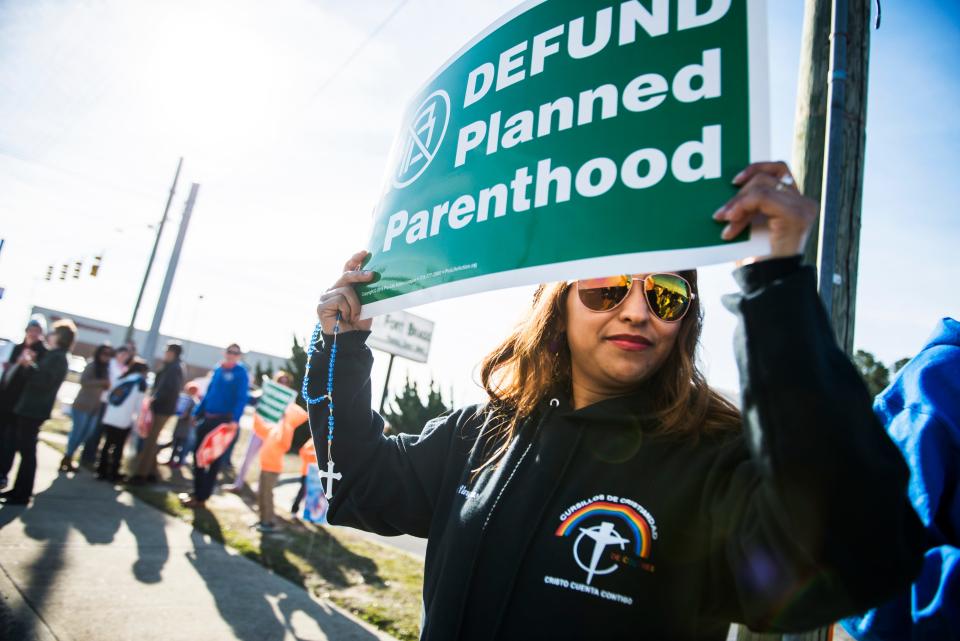What does the Supreme Court abortion ruling mean for NC? 3 things you need to know
The U.S. Supreme Court ruling on Friday to again allow the states to prohibit abortion is expected to significantly increase the total number of abortions in North Carolina — not stop them.
But it also will curtail abortions in this state following the 20th week of pregnancy.
Why?
Read on. Here are three things to know about what is next for abortion in North Carolina now that the Supreme Court has overturned the 1973 Roe vs. Wade decision.

Abortion won’t be blocked in North Carolina until 2023 at the soonest
Abortion won’t be made illegal here this year, both anti-abortion lawmakers and abortion rights activists said recently. Through the end of 2022, North Carolina’s Republican-majority legislature won’t be able to get anti-abortion laws past Democratic Gov. Roy Cooper’s veto stamp, they said.
While Democrats in the legislature have the numbers to sustain Cooper’s vetoes through the end of this year, that could change following the November elections for the General Assembly. Cooper isn’t on the ballot, but all 120 seats in the state House and all 50 seats of the state Senate are up for election.

If the Republicans win at least 72 House seats and at least 30 Senate seats, they will be able to override most vetoes at will starting in January 2023. In November, the GOP needs to pick up just three House seats and two Senate seats to reach veto-proof supermajorities.
Even if they win big in November, the Republican lawmakers may consider public opinion before banning abortion next year.
According to a public opinion poll of North Carolina voters conducted in April by Meredith College, 52.6% wanted the state to continue allowing abortions as has been permitted until now. Abortion has been legal until approximately the 24th week of pregnancy.
Overall, 61.7% of those surveyed said abortion should be legal until the 15th week of pregnancy.
A similar poll was conducted June 8 to June 12 by SurveyUSA for television news station WRAL. It framed its questions somewhat differently from the Meredith poll. It said 45% of respondents did not want the Supreme Court to overturn Roe vs. Wade and 55% wanted N.C. abortion laws to either stay the same as now or become less restrictive.
However, the results of WRAL’s survey also say:
57% of North Carolinians would restrict abortions after the 20th week of pregnancy, and 31% oppose doing that, with 12% not sure.
45% would restrict abortion after the sixth week of pregnancy and 39% oppose this. The remaining 15% were unsure.
SurveyUSA said it surveyed 1,100 adults and the credibility interval, which is similar to a margin of error, is plus-or-minus 3.8%.
Abortions are likely to increase in NC
Friday’s abortion ruling portends an increase in the number of abortions in North Carolina as it remains legal here but is banned or curtailed in nearby states, experts have said.
According to the Guttmacher Institute, an abortion rights organization, most states in the South are expected to reduce or end access to abortion. That would leave North Carolina as the nearest place for hundreds of thousands, and possibly millions of women, to obtain abortions, it said.
North Carolina abortion providers recently said they are preparing for an increase in out-of-state patients.
The North Carolina Department of Health and Human Services reports that in 2020, 30,004 abortions were performed in this state. There were 25,058 for North Carolina residents and 4,946 for women from other states.
The USA TODAY Network reported that among states that border North Carolina:
Tennessee has a “trigger ban” — a ban on abortion that would be triggered by a Supreme Court ruling to overturn Roe vs. Wade. That could take 30 days to take effect. In the meantime, other Tennessee laws that restrict abortion would take effect, including a ban on abortions after the sixth week of pregnancy.
Georgia has a sixth-week “fetal heartbeat” law that it could seek to enforce with the overturn of Roe.
South Carolina also has a law banning abortion after six weeks, but that has been unenforced per court order. The Supreme Court’s ruling brings that law back into play.
South Carolina: What end of Roe v. Wade could mean in the Palmetto State
Tennessee trigger law: If Roe v. Wade is overturned, two pathways will determine when abortion ban starts
In Georgia: Ruling clears way for fetal-heartbeat law to be enforced
A ban on abortions after 20 weeks takes effect in North Carolina
A ban on abortions following the 20th week of gestation is already on North Carolina’s statutes. But until now, that law was unenforceable because of the Supreme Court’s 1973 Roe vs. Wade ruling and a related case from 1992, called Planned Parenthood vs. Casey.
That law becomes enforceable with the new ruling, said constitutional law professor Theodore Shaw at the University of North Carolina School of Law.
That law says abortions after the 20th week of pregnancy are allowed only in a medical emergency in which the continued pregnancy threatens to kill the mother or cause “substantial and irreversible physical impairment of a major bodily function.”
As a practical matter, few abortions would be stopped by a 20-week law.
According to a study by the U.S. Centers for Disease Control, nationwide in 2016, only 1.2% of all abortions were done after the 20th week of gestation. It says 91% were done no later than the 13th week.
In detail, out of more than 431,000 abortions in 40 states and New York City in 2016:
65.5% were performed no later than the eighth week of gestation.
25.5% were done in the 9th to 13th weeks.
3.6% were in the 14th and 15th weeks.
2.1% were in the 16th and 17th weeks.
2% were in the 18th and 20th weeks.
1.2% were in pregnancies of 21 weeks or longer.
Senior North Carolina reporter Paul Woolverton can be reached at 910-261-4710 and pwoolverton@gannett.com.
This article originally appeared on The Fayetteville Observer: What does overturning Roe v Wade mean for North Carolina?

